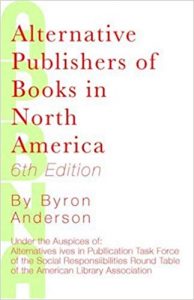Alternative Publishers of Books in North America
6th Edition
Compiler: Byron Anderson
Price: Out of print
Published: October 2006
ISBN: 978-0-977861-72-9
191 pages
This out-of-print reference book is now continued by an online resource called Alternatives in Print. The Alternatives in Print database includes the publishers from this directory as well as periodicals from Annotations, the directory from the Alternative Press Center.
Read an excerpt
This out-of-print reference book is now continued by an online resource called Alternatives in Print.
